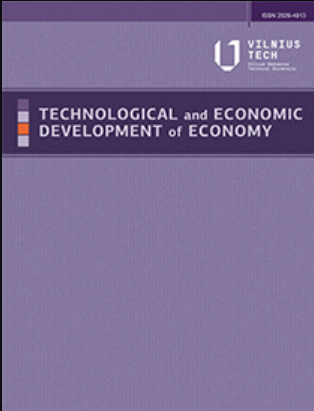REGIONAL DIGITAL ECONOMY IN THE DANUBE MEMBER STATES UNDER THE IMPACT OF THE NEW CHALLENGES
IF 3.9
2区 经济学
Q1 ECONOMICS
引用次数: 0
Abstract
The paper aims to analyse the changing economic structure and the trends of the digitalization amplification through the prism of a dynamic multi-criteria model, assessing the strategic perspective by pivoting digitalization in the strategic equation. The main objectives of the research cover the context of vulnerability across the EUSDR countries, the solutions from the literature review and the definition, testing and implementing of a new dedicated model. The model takes into account regional indicators, reported by Eurostat. Statistical analysis procedures and methods were applied in order to capture the expected disparities under the impact of the pandemic, as well as harmonization with European Strategy for Danube Region (EUSDR) – specific impact indicators. The analysis uses la latest official statistical data from Eurostat. The importance of this scientific approach lies in the fact that the results are applicable to the wider region, the vast majority of the Danube states being EU members (9 states), 3 candidate states and 2 potential candidate states in the new geo-political and military context. States that are not yet EU members have regional and cross-border cooperation agreements with the EU. Moreover, the region itself has reacted in a unified way to the challenges of the economic and pandemic crises, the study being conducted over the period 2004–2020. In addition, EU Member States have additionally benefited from European emergency allocations to counter the effects of the global economic crisis and stem the spread of the pandemic. We used empirical and analytical methods, starting with the study of literature, data collection and consolidation of the database, its homogeneity and the application of modelling procedures. The major key findings are focused on the existence of a strong connection between investment effort, labour skills, sustainable development and the digital economy able to face new global and regional challenges. The policy implication of this research consist in offering viable elements capable of assisting regional decision-makers in adopting topical measures on digitisation and reconfiguring strategic regional connections to maintain a sustainable direction for the EUSDR. The recommendations from this study imbraca forma some directions for action related to labour high skills, digitalization, R&D investment and e-commerce.区域数字经济在多瑙河成员国冲击下面临新的挑战
本文旨在通过动态多标准模型的棱镜分析经济结构的变化和数字化放大的趋势,通过在战略方程中旋转数字化来评估战略前景。研究的主要目标包括EUSDR国家的脆弱性背景、文献综述中的解决方案以及新的专用模型的定义、测试和实施。该模型考虑了欧盟统计局(Eurostat)报告的区域指标。采用了统计分析程序和方法,以便掌握大流行病影响下的预期差异,并与《欧洲多瑙河地区战略》的具体影响指标保持一致。该分析使用了欧盟统计局最新的官方统计数据。这种科学方法的重要性在于其结果适用于更广泛的地区,在新的地缘政治和军事背景下,绝大多数多瑙河国家是欧盟成员国(9个国家),3个候选国和2个潜在候选国。尚未成为欧盟成员国的国家与欧盟有区域和跨境合作协议。此外,该区域本身以统一的方式应对了经济危机和大流行病危机的挑战,这项研究是在2004-2020年期间进行的。此外,欧盟成员国还从欧洲紧急拨款中受益,以应对全球经济危机的影响并遏制该流行病的蔓延。我们使用了实证和分析方法,从文献研究、数据收集和数据库整合、其同质性和建模程序的应用开始。主要的关键发现集中在投资努力、劳动技能、可持续发展和能够面对新的全球和区域挑战的数字经济之间存在着紧密的联系。本研究的政策含义在于提供可行的要素,能够协助区域决策者采取有关数字化和重新配置战略区域联系的专题措施,以保持EUSDR的可持续发展方向。本研究提出的建议为劳动力高技能、数字化、研发投资和电子商务等方面的行动提供了一些方向。
本文章由计算机程序翻译,如有差异,请以英文原文为准。
求助全文
约1分钟内获得全文
求助全文
来源期刊
CiteScore
10.00
自引率
8.50%
发文量
66
审稿时长
15 weeks
期刊介绍:
Technological and Economic Development of Economy is a refereed journal that publishes original research and review articles and book reviews. The Journal is designed for publishing articles in the following fields of research:
systems for sustainable development,
policy on sustainable development,
legislation on sustainable development,
strategies, approaches and methods for sustainable development,
visions and scenarios for the future,
education for sustainable development,
institutional change and sustainable development,
health care and sustainable development,
alternative economic paradigms for sustainable development,
partnership in the field of sustainable development,
industry and sustainable development,
sustainable development challenges to business and management,
technological changes and sustainable development,
social aspects of sustainability,
economic dimensions of sustainability,
political dimensions of sustainability,
innovations,
life cycle design and assessment,
ethics and sustainability,
sustainable design and material selection,
assessment of environmental impact,
ecology and sustainability,
application case studies,
best practices,
decision making theory,
models of operations research,
theory and practice of operations research,
statistics,
optimization,
simulation.
All papers to be published in Technological and Economic Development of Economy are peer reviewed by two appointed experts. The Journal is published quarterly, in March, June, September and December.

 求助内容:
求助内容: 应助结果提醒方式:
应助结果提醒方式:


